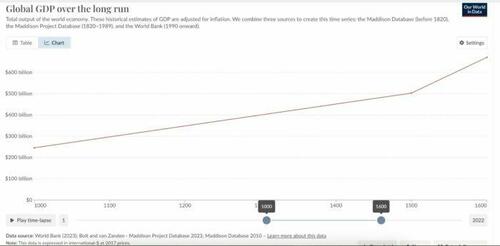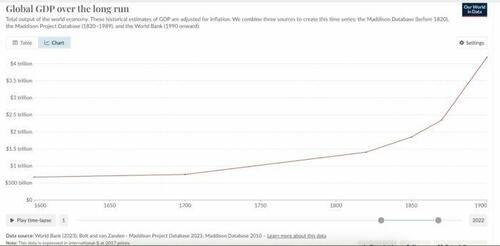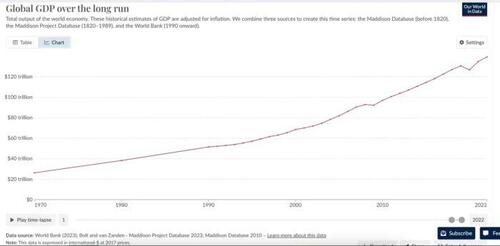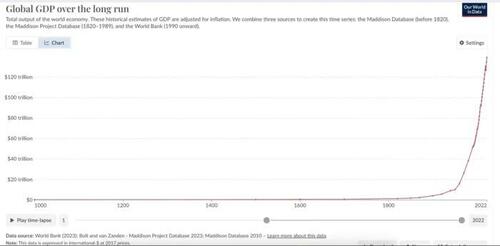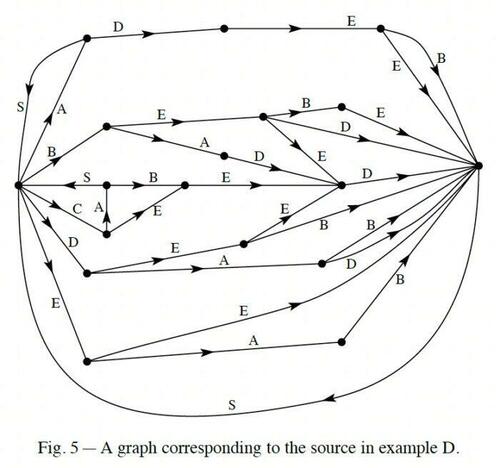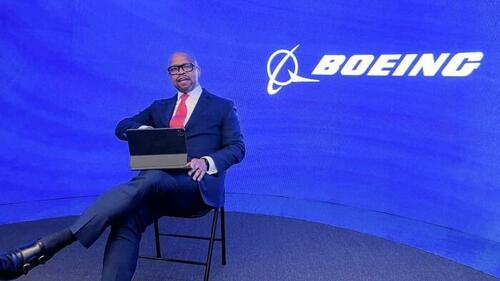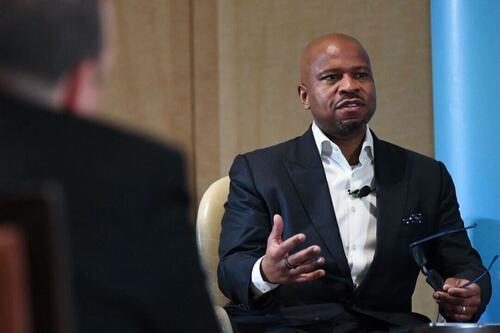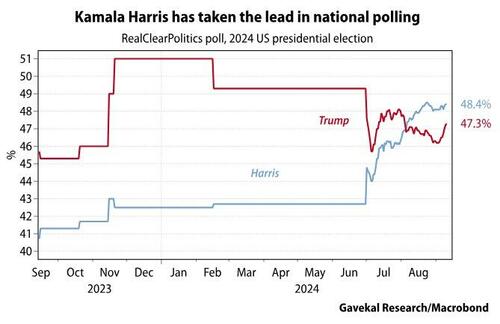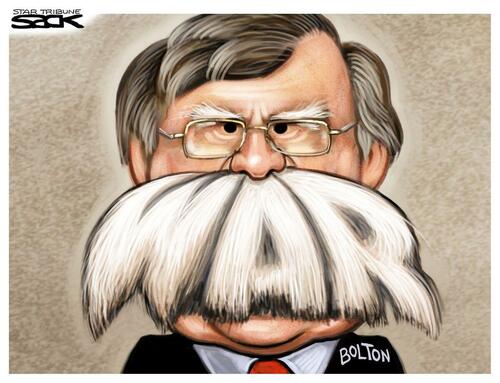Authored by Julie Kelly via RealClearinvestigations,
To Many, the Justice Dept. Is Honoring Political Neutrality in the Breach Again
Attorney General Merrick Garland broke precedent just weeks before the November election, delivering politically charged remarks at the U.S. Attorneys’ National Conference in Washington – pointedly speaking publicly rather than privately in a departure from his usual practice.

“Our norms are a promise that we will not allow this department to be used as a political weapon,” he said before a packed house, gathered in the Great Hall of DOJ headquarters on Sept. 12. “Federal prosecutors and agents may never make a decision regarding an investigation or prosecution for the purpose of affecting any election or the purpose of giving an advantage or disadvantage to any candidate or political party.”
Garland’s words came in response to former President Trump’s assertion during his debate with Kamala Harris that the FBI and Justice Department had been weaponized against him. But in issuing a fiery rebuttal, the attorney general put himself squarely where he said he didn’t want to be: namely, in the crossfire of a partisan political campaign.
Moreover, in the view of many, his assertions clearly belie the Justice Department’s deeds. These critics say it’s obvious that the FBI and DOJ have repeatedly put a thumb on the scale of justice to defeat Trump. In 2016, it was the Russia-gate collusion hoax. In 2020 it was the FBI’s refusal to say not only that it was in possession of Hunter Biden’s incendiary laptop, but that it had verified its contents, even as Joe Biden claimed erroneously that it was a Russian plant.
Most recently, after being rebuffed by the Supreme Court, Special Counsel Jack Smith filed a new indictment against Donald Trump regarding the 2020 election, just 74 days before Election Day. DOJ guidelines advise against filing politically relevant charges 60 days before an election.
In recent weeks, DOJ, led by U.S. Attorney for the District of Columbia Matthew Graves, has accelerated the arrest of those who protested at and breached the Capitol on Jan. 6, 2021. Several new defendants live in swing states, which reintroduces Jan. 6 in local and national headlines while bolstering key talking points of Democrat standard-bearer Kamala Harris and others in this year’s campaign.
Such Trump antagonists regularly describe the former president as a “threat to democracy” – rhetoric echoed by the second and latest alleged would-be Trump assassin to emerge in the campaign, before his arrest Sunday.
On the same day Garland addressed the conference, the FBI arrested Justina Guardino, a 34-year-old member of a North Carolina chapter of Moms for Liberty, a nationwide group of moms defending their children from “woke” ideology and government overreach; Trump spoke to the group in Washington last month.
According to DOJ charging documents, Guardino nonviolently entered the Capitol on Jan. 6 and stayed inside for approximately 10 minutes.
Despite being interviewed by law enforcement in the summer of 2022, the FBI waited more than two years to make and announce her arrest, raising questions as to whether the DOJ is delaying arrests to coincide with the election. Early voting begins in North Carolina in mid-October.
Since Aug. 1, Graves’ office has announced the arrest of several more J6ers, including individuals from Pennsylvania, Virginia, and Michigan, considered must-win states for Harris.
Appointed by Joe Biden in 2021, Graves appears to be fulfilling his pledge to bring the overall J6 caseload to 2,000 defendants before the statute of limitations runs out; the total number of defendants just exceeded 1,500 last week. Meanwhile, his office has brought one federal charge against a single pro-Hamas demonstrator despite hundreds being involved in unlawful activities such as attacking federal police officers, vandalizing property, and illegally occupying government buildings on numerous occasions in 2023 and 2024.
Graves also handled the prosecution of Trump allies Peter Navarro and Steven Bannon on contempt of Congress charges for defying subpoenas issued by the Democrat-controlled House January 6 Select Committee. Although both prosecutions resulted in prison time for Navarro and Bannon, critics note that the cases were brought at the discretion of the department. Bannon is currently serving a four-month sentence in a Connecticut federal prison, successfully shutting down his popular “War Room” program during the height of the campaign season.
In what might also be considered election interference by the DOJ, Graves, who rarely conducts interviews, appeared in a J6 segment on “60 Minutes” on the evening of September 15 – just hours after the alleged assassination attempt against Trump on his West Palm Beach golf course.
Graves defended his ongoing J6 investigation and prosecution as fair and free of White House influence. (Graves said he has never met Joe Biden, but as RCI reported last year, Graves’ wife, Fatima Goss Graves, is a regular visitor at the White House.) “No one is being prosecuted for their views,” Graves told reporter Scott Pelley. “They’re being prosecuted for their acts.”
The “crime was severe,” Graves continued. “It was an attack on our democracy.”
But the DOJ recently hit a major roadblock in the J6 prosecution, calling into question Garland’s claims of a careful adherence to the rule of law devoid of bias.
The Supreme Court’s decision in Fischer v. United States reversed how the DOJ applied a statute, 1512(c)(2), obstruction of an official proceeding, in the Capitol Breach probe. Since early 2021, at least 340 Jan. 6 protesters and Donald Trump have been charged with the post-Enron statute, once understood to apply to document-altering. In many instances, the felony was added to otherwise misdemeanor cases to turn nonviolent protesters into felons. Prosecutors also used the threat of adding the felony enhancement to secure plea deals on lower-level charges.
At least 130 individuals have been convicted at trial or accepted plea deals on the obstruction count with many sentenced to prison time.
Since the Fischer decision was published, prosecutors have been dismissing the count in pending cases. Last week, the D.C. appellate court vacated 15 1512(c)(2) convictions. Dozens more will see their convictions vacated over the next several weeks.
But the relief did not come soon enough for defendants who already served prison time on the charge. Further, the DOJ is asking judges to keep defendants currently in jail on the 1512(c)(2) behind bars by seeking longer prison time on their remaining charges.
For example, Thomas Robertson, a former police officer from Virginia, was sentenced to 87 months following his conviction by a D.C. jury in 2022. The 1512(c)(2) conviction represented the bulk of the prison sentence since it is punishable by up to 20 years in prison.
This month the DOJ dismissed the obstruction count against Robertson, but prosecutors asked Judge Christopher Cooper to keep Robertson incarcerated for the full term by applying several sentencing add-ons to his conviction.
“I think what happened that day was an attack on democracy, and, as this Court found, the defendant advocated for an armed rebellion and counterinsurgency, and he came with the intent to do violence,” assistant U.S. Attorney Elizabeth Aloi told Cooper on Sept. 4. “Robertson was an avid and willing participant in an unprecedented crime. His offenses specifically targeted the peaceful transfer of power, an essential government function and one of the fundamental and foundational principles of our democracy.”
Cooper, whose 1999 wedding was officiated by then-Judge Merrick Garland, consented to most of the DOJ’s sentencing enhancements. He sentenced Robertson to 72 months in federal prison.
“The historical significance of the certification and the effect that your conduct had on our democratic principles and the country more generally, this is not just hyperbole,” Judge Cooper told Robertson. “These are very real harms that not just you, but including you, caused on January 6th.”
The DOJ is expected to make the same argument in several other cases.
“The continued harsh treatment of Jan. 6 prisoners is a glaring example of the egregious weaponization of our justice system under the Biden-Harris administration,” Rep. Eric Burlison, a Missouri Republican, who recently was denied access to a section of the D.C. jail that houses J6 defendants, told RCI. “This politicized use of the Department of Justice, spearheaded by Kamala Harris and her allies, has turned the legal system into a tool for silencing dissent and punishing political opposition.”
Critics say Garland’s ongoing prosecution of Trump also contradicts his insistence that the DOJ steers clear of national elections. Special Counsel Smith, appointed by Garland in November 2022, just renewed the stalled case against Trump related to the events of Jan. 6 in Washington. Smith could have waited until after the election to file his new indictment, and critics say his timing can be an interpreted to bolster J6 as a campaign issue.
The Justice Department continues to allocate resources to the special counsel’s office; recent financial disclosures show Smith and DOJ spent more than $35 million in the first 14 months of the special counsel’s investigation. That figure likely could double by the time his appointment ends, which is at the discretion of the attorney general, or include the amount spent on the dual investigations before Smith was appointed.
Smith’s continued pursuit of Trump has drawn renewed scrutiny and skepticism since the Supreme Court challenged his original indictment as a broad attack on presidential immunity.
On July 1, the court published its decision in Trump v. United States. Authored by Chief Justice John Roberts, the 6-3 opinion for the first time in history established three categories of presidential immunity from criminal prosecution: official acts, outer perimeter acts, and private acts. Official acts, the court held, are covered by immunity while outer perimeter acts – such as Trump’s communications with Vice President Mike Pence related to the J6 indictment – are what Roberts described as “presumptively immune.” On that score, Roberts continued, “it is ultimately the Government’s burden to rebut the presumption of immunity.”
The court further concluded that former presidents are not immune from prosecution for “unofficial” or private acts.
In order to hew to the decision, Smith filed a superseding indictment on Aug. 28 that partially gutted his original indictment, which had been handed up a year earlier. Since the Supreme Court determined Trump’s interactions with DOJ officials fell safely within the core constitutional authority of a sitting president, Smith had to cut nine pages of evidence and drop a co-conspirator, former Assistant Associate Attorney General Jeffrey Clark.
Although the watered-down indictment contains the same four counts as the first version, the case remains on uncertain legal ground given the Supreme Court’s immunity ruling and opinion in the Fischer case.
But the special counsel, presumably with the consent of Attorney General Garland, is reinvigorating the case to coincide with the final weeks of the 2024 presidential campaign. Long-standing DOJ rules preventing the department from interfering in national elections are once again being ignored as Smith reappears in the headlines as early voting begins this month in several states including Virginia, Wisconsin, and Minnesota. In early October early voting commences in the key swing states of Pennsylvania, Georgia, Arizona, North Carolina, and Nevada.
Smith found a like-minded ally in Judge Tanya S. Chutkan, the Obama appointee presiding over the unprecedented case. It was Chutkan’s 2023 order denying Trump’s claims of immunity from prosecution that the Supreme Court overturned and sent back to her for further proceedings.
Chutkan, who has a record of making anti-Trump statements in court and who imposed a gag order on the former president last year, told Trump’s lawyers at a Sept. 5 hearing that the election is not a factor in her calculation as to the next steps.
“I understand there is an election impending, and I’ve said before and I say again that the electoral process and the timing of the election and what needs to happen before or shouldn’t happen before the election is not relevant here,” Chutkan informed John Lauro, Trump’s lead attorney in the J6 case. “This court is not concerned with the electoral schedule,” she added.
In a follow-up scheduling order, Chutkan issued a series of deadlines leading right up to and a few days beyond Election Day. The special counsel will file a brief later this month articulating why he believes the existing elements of the J6 indictment are not protected under the Supreme Court ruling.
By permitting the filing of what even Chutkan herself described as a “procedurally irregular” document, Smith’s brief is likely to contain cherry-picked passages from grand jury testimony and other allegations to create damaging headlines that again claim Trump tried to stay in power by breaking the law.
The brief is expected to be filed before Sept. 26; Trump’s attorneys will have a chance to respond, further dragging the matter into the headlines.


